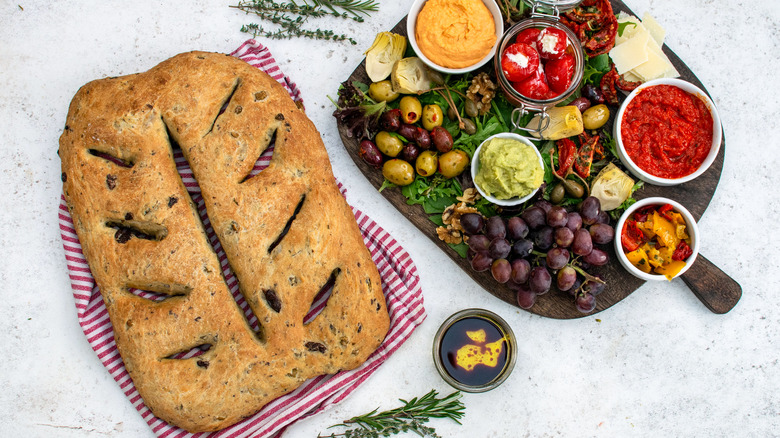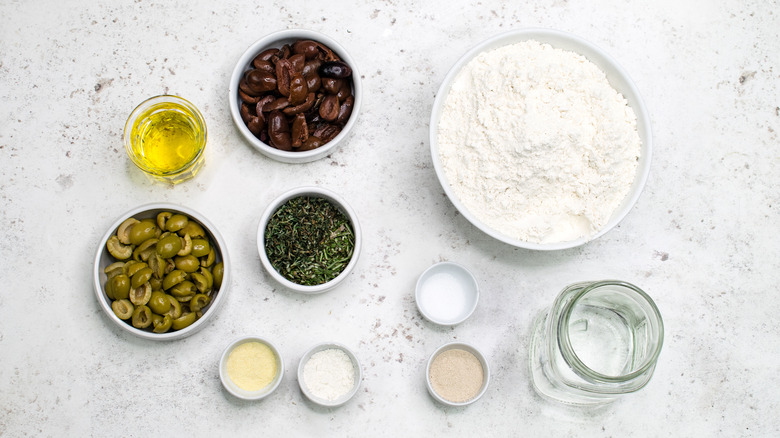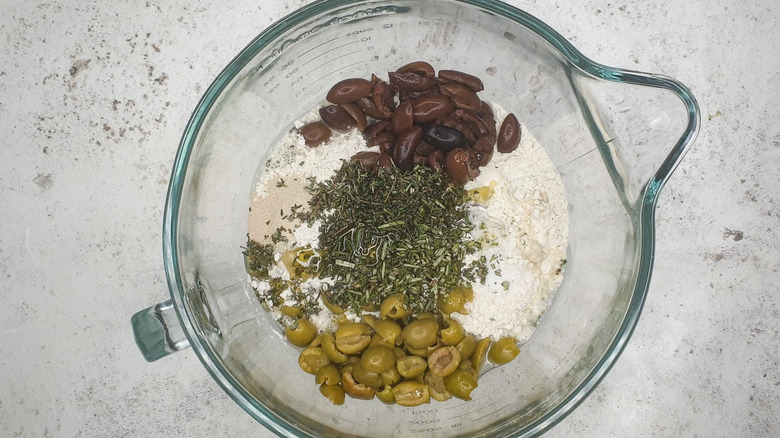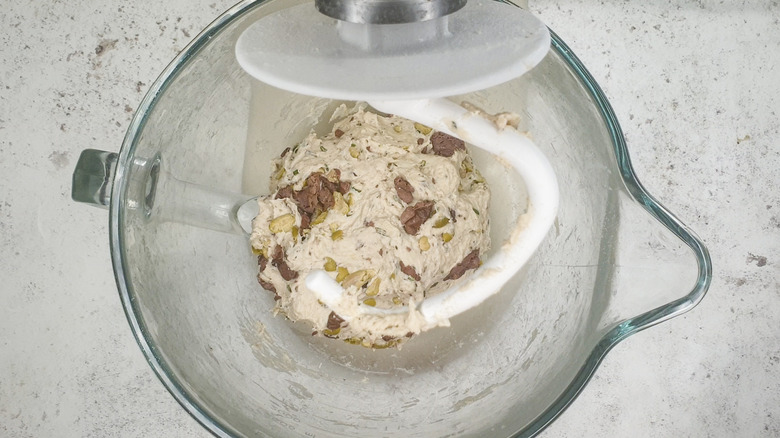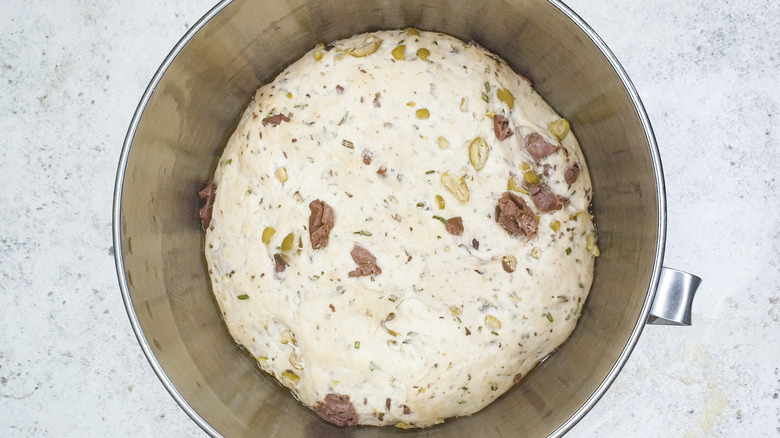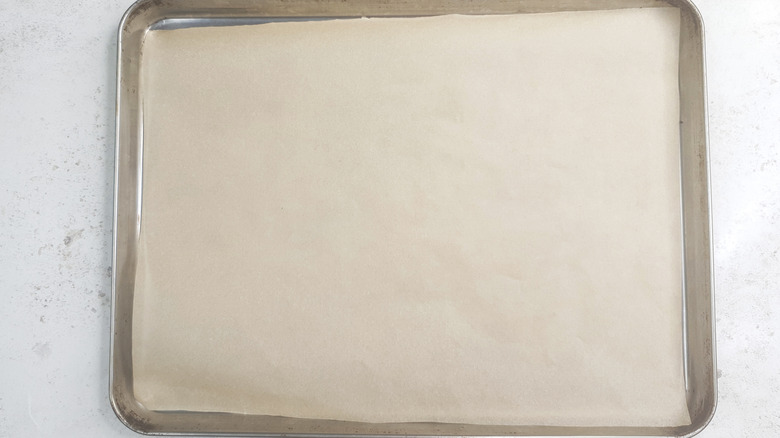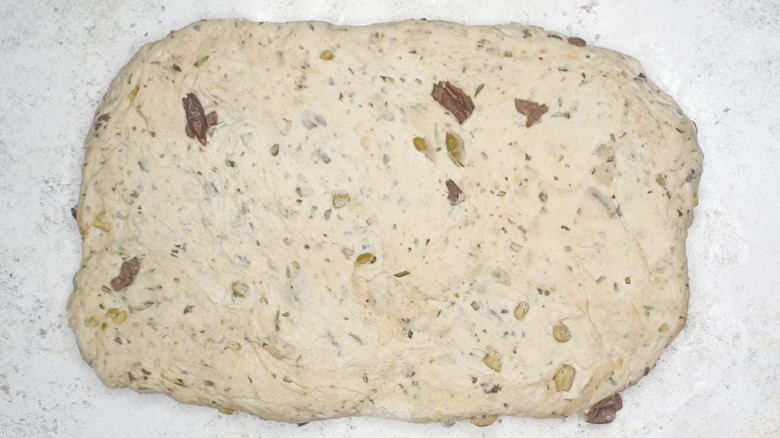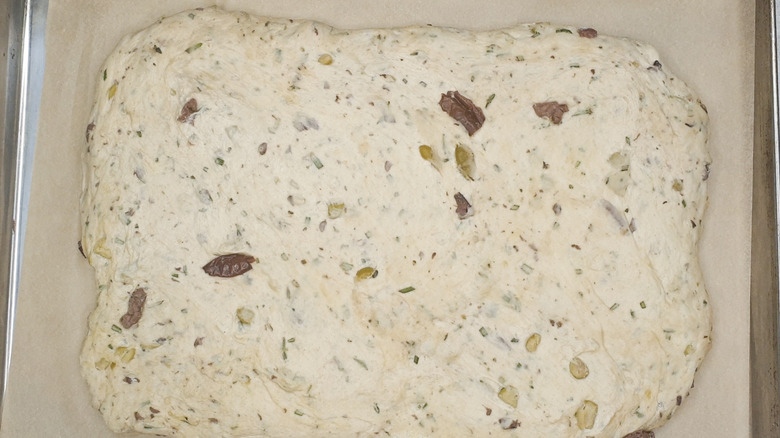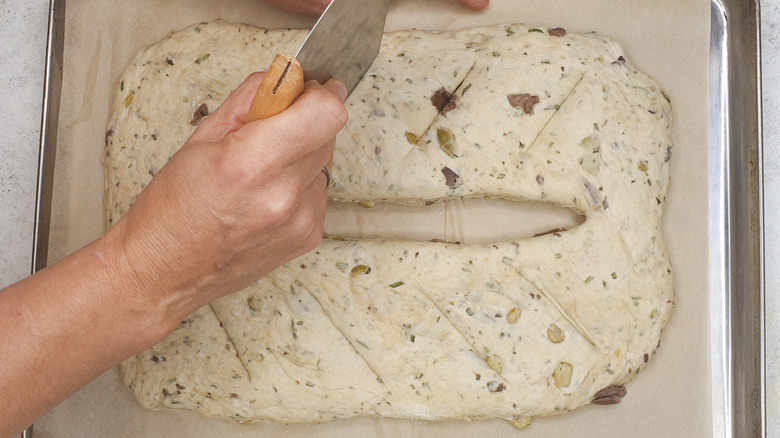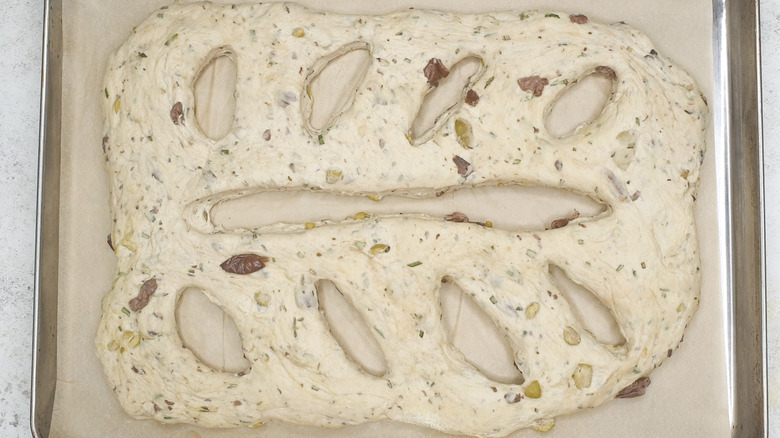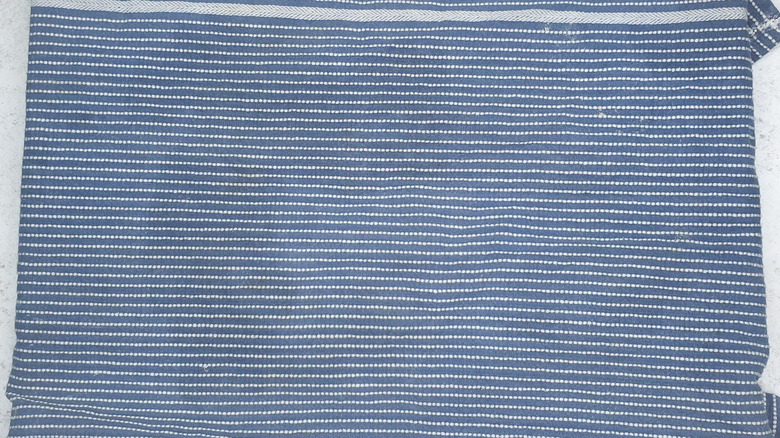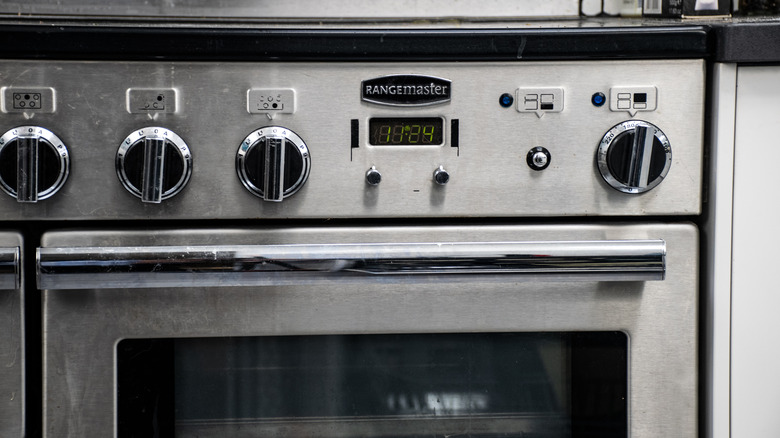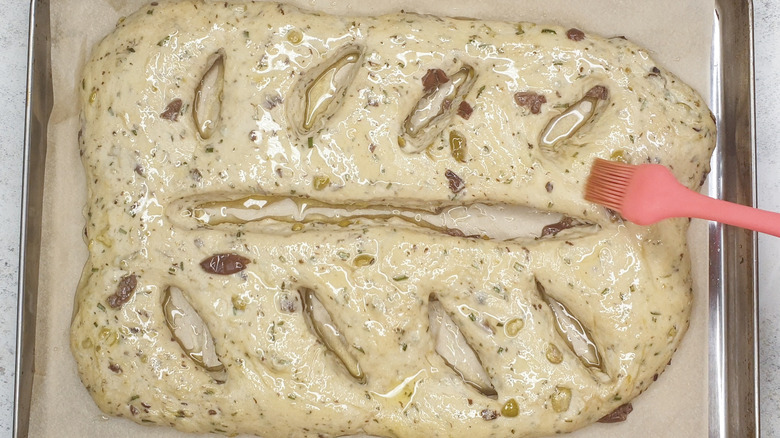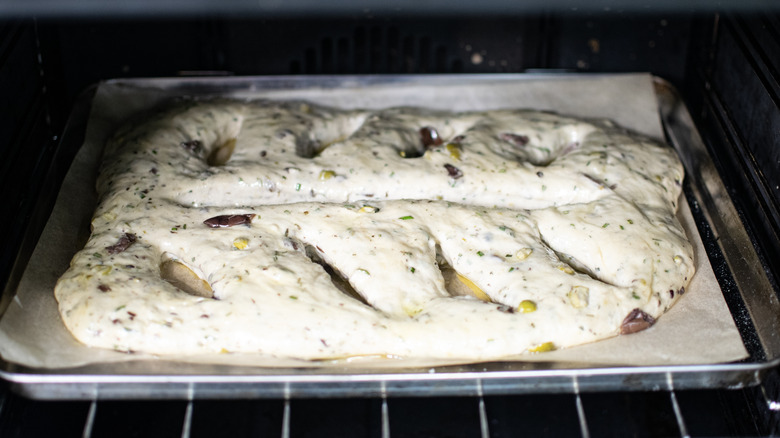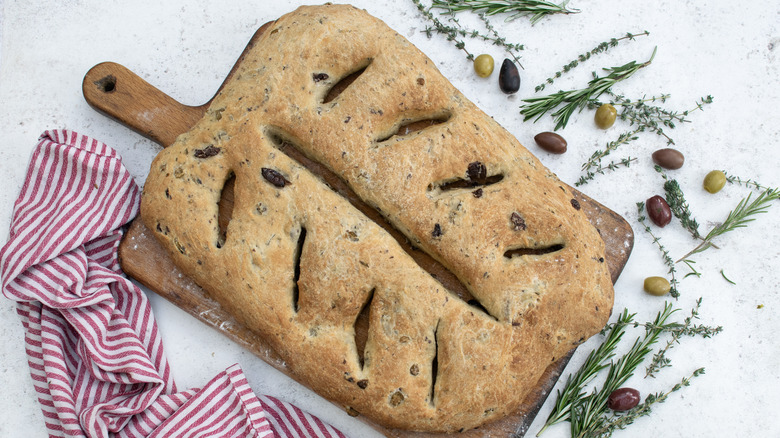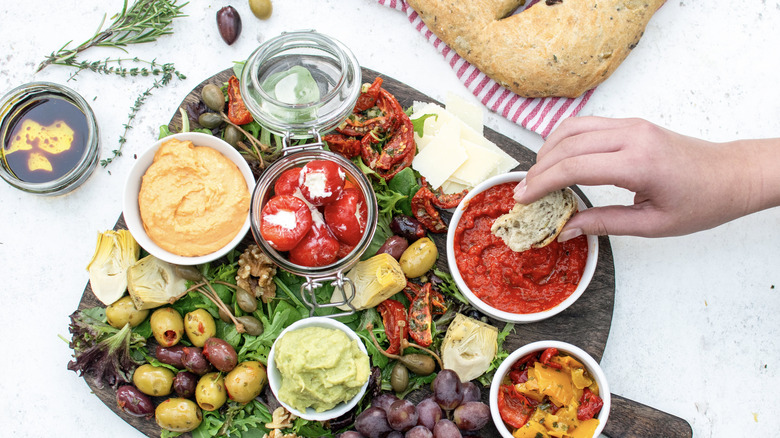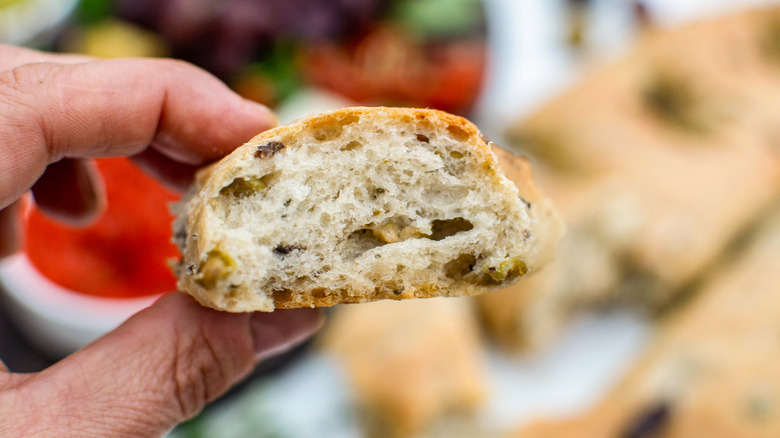Mediterranean Herb And Olive Fougasse Recipe
Fougasse, a traditional French bread known for its distinctive leaf design, is one of French recipe developer Annabelle Randles' favorite kinds of bread. As she explains, it conjures up memories of summer holidays in the South of France. Fougasse originates from the Provence region and in its simplest form is made from bread flour, yeast, water, and olive oil. It has many variations, and for this recipe, Randles is using olives and herbs for extra flavor. This is an easy and straightforward recipe that is sure to impress guests around the dining table.
Fougasse is the ideal sharing bread as its unique and artistic leaf-shaped design makes it perfect for tearing off pieces. It is slashed or cut in a way that gives it a striking appearance. To ensure the bread cooks evenly, make sure that every element of it has the same thickness. For the design of the fougasse to show, each leaf should have about a 1-inch gap.
Fougasse is often eaten as an appetizer in France. However, it is very versatile so you can also serve it as a side with a variety of dishes such as soups, stews, and salads. Its semi-tender crumb and olive oil-rich dough make it a satisfying accompaniment to a wide range of main courses. You can also use fougasse to make delicious sandwiches.
Gather the ingredients for this Mediterranean herb and olive fougasse
The base of this Mediterranean herb and olive fougasse is made with bread flour, instant yeast, salt, water, and olive oil. To add depth and flavor, Randles adds kalamata olives, green olives, fresh rosemary leaves, and fresh thyme leaves. You will also need some semolina to dust the fougasse as well as some extra olive oil to brush on the bread before baking for extra flavor and color.
Randles favors kalamata olives for their unique rich, fruity, and slightly sweet flavor. They have a firm and hearty texture that makes them a tasty addition to this fougasse bread. Randles recommends using a chunky variety of green olives such as Castelvetrano or Cerignola to infuse the bread with even more Mediterranean flavor. If you prefer using dry herbs, you can substitute the fresh rosemary and thyme with 2 teaspoons of dried rosemary and 2 teaspoons of dried thyme.
Step 1: Mix the ingredients
In a mixing bowl, combine the flour, yeast, salt, olives, herbs, water, and olive oil.
Step 2: Knead the dough
Knead the dough until it is elastic and supple, about 5 minutes using a stand mixer fitted with a dough hook or 10 minutes by hand. Add more flour or water as necessary.
Step 3: Leave the dough to rise
Place the dough in a clean oiled bowl. Cover and leave to rest in a warm space until the dough has doubled in size, about 2 hours.
Step 4: Line a large baking sheet
Line a large baking sheet with parchment paper.
Step 5: Shape the dough
Lightly flour your work surface with a mixture of 1 tablespoon of semolina and 1 tablespoon of bread flour. Tip the dough out and shape it into a ½ inch thick rectangle of about 13 x 8 inches.
Step 6: Transfer the dough to the baking sheet
Transfer the dough to the baking sheet.
Step 7: Slit the fougasse
Using a bench scraper or pizza cutter, cut the fougasse in the middle leaving a 1-inch border at the top and bottom. Cut 4 diagonal slots on each side, leaving a 1-inch border on each side.
Step 8: Stretch the fougasse leaves
Stretch the dough carefully to make each cut slightly bigger. For the design of the fougasse to show, each leaf should have about 1-inch gap.
Step 9: Proof the fougasse
Cover with a cloth and leave to proof in a warm place for 30 minutes.
Step 10: Preheat the oven
Preheat the oven to 425 F.
Step 11: Brush the fougasse with oil
Brush the fougasse with olive oil.
Step 12: Bake the fougasse
Bake in the oven until golden, about 20 to 25 minutes.
Step 13: Leave the fougasse to cool
Leave to cool before serving.
How to create the perfect fougasse antipasti board
Creating a fougasse antipasti board or platter is a wonderful way to showcase this unique and flavorful bread alongside a variety of complementary Mediterranean-inspired ingredients. It is perfect for sharing with friends and family, whether as an appetizer for a special occasion, a picnic spread, or a relaxed evening of entertaining.
Dips and spreads are ideal to accompany fougasse: Try olive tapenade, hummus, tzatziki, chunky salsa, whipped feta dip, smashed avocado, and baba ghanoush. Cheeses such as cubed feta, sliced manchego, or pecorino make a tasty addition. A selection of cold cuts and charcuterie is also a popular choice. When in season, you can also include grapes, melon, watermelon, or figs.
Randles also likes to add a variety of olives, mixed nuts, salad leaves, sundried tomatoes, chargrilled peppers, capers, stuffed cherry peppers, and roasted artichoke hearts, as well as extra virgin olive oil and balsamic vinegar for dipping.
Can you freeze fougasse?
While fougasse is best eaten fresh, you can freeze leftovers for up to 3 months. To prevent excess moisture from building up, make sure the fougasse has completely cooled before wrapping it tightly in plastic wrap or aluminum foil. Make sure to squeeze out any excess air to minimize the risk of freezer burn. For added protection against freezer burn, you can also double-bag the wrapped fougasse in a resealable freezer bag or wrap it i both plastic wrap and aluminum foil.
When you're ready to use the frozen fougasse, remove it from the freezer and let it thaw at room temperature. Thawing times will vary depending on the size and thickness of the fougasse as well as the ambient temperature. You should count 1 to 2 hours for smaller pieces and up to 4 hours for a whole fougasse. To restore the fougasse's freshness, Randles advises reheating it in a preheated oven at around 350-375 F for about 10 minutes.
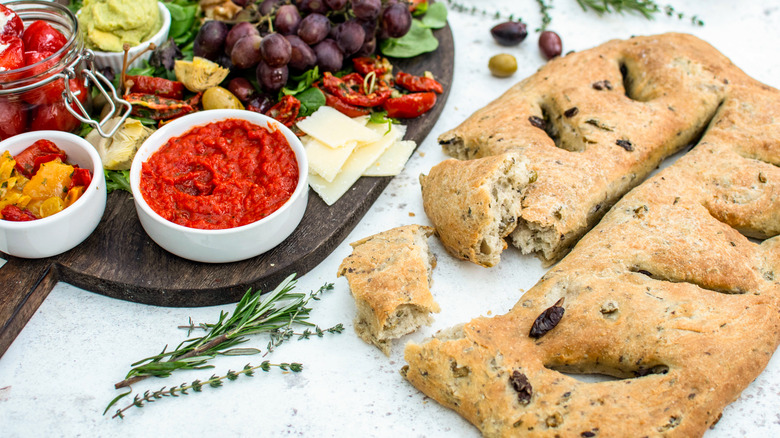
- 4 cups bread flour
- 2 teaspoons instant yeast
- 1 teaspoon salt
- ¾ cup pitted kalamata olives, halved
- ¾ cup pitted green olives, halved
- 2 tablespoons finely chopped fresh rosemary leaves
- 2 tablespoons finely chopped fresh thyme leaves
- 1 ¼ cups slightly warm water
- 2 tablespoons olive oil
- 1 tablespoon semolina
- 1 tablespoon bread flour
- Extra olive oil to brush the fougasse
- In a mixing bowl, combine the flour, yeast, salt, olives, herbs, water, and olive oil.
- Knead the dough until it is elastic and supple, about 5 minutes using a stand mixer fitted with a dough hook or 10 minutes by hand. Add more flour or water as necessary.
- Place the dough in a clean oiled bowl. Cover and leave to rest in a warm space until the dough has doubled in size, about 2 hours.
- Line a large baking sheet with parchment paper.
- Lightly flour your work surface with a mixture of 1 tablespoon of semolina and 1 tablespoon of bread flour. Tip the dough out and shape it into a ½ inch thick rectangle of about 13 x 8 inches.
- Transfer the dough to the baking sheet.
- Using a bench scraper or pizza cutter, cut the fougasse in the middle leaving a 1-inch border at the top and bottom. Cut 4 diagonal slots on each side, leaving a 1-inch border on each side.
- Stretch the dough carefully to make each cut slightly bigger. For the design of the fougasse to show, each leaf should have about 1-inch gap.
- Cover with a cloth and leave to proof in a warm place for 30 minutes.
- Preheat the oven to 425 F.
- Brush the fougasse with olive oil.
- Bake in the oven until golden, about 20 to 25 minutes.
- Leave to cool before serving.
